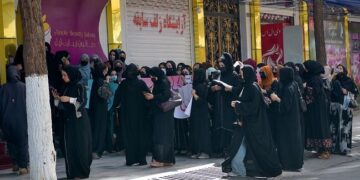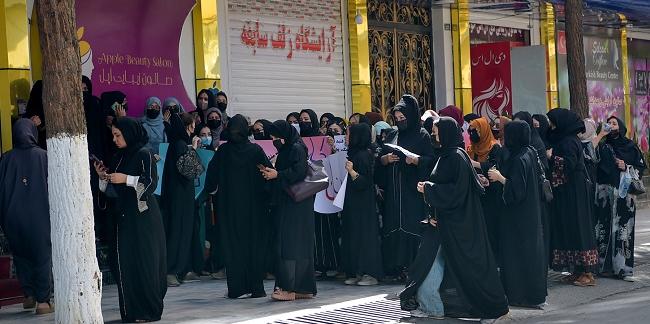By Enyichukwu Enemanna
Women in Afghanistan on Wednesday staged a peaceful protest in Kabul against an order by Taliban authorities to shut down beauty parlours, a move see an effort to squeeze them out of public life.
Taliban had last month forced the closure of thousands of beauty parlours nationwide operated by women, which is only major source of income for many families.
They outlawed one of the opportunities available for women to socialise away from home.
Since it took over power in August 2021, the Taliban government has barred girls and women from high schools and universities, banned them from parks, funfairs and gyms, and ordered them to cover up in public.
“Don’t take my bread and water,” a placard carried by one of the protesters on Butcher Street, which hosts a concentration of the capital’s salons reads.
Public protests are not common in Afghanistan and are usually dispersed by force.
AFP however reports that about 50 women took part in Wednesday’s gathering, which attracted the attention of security personnel.
Protesters later shared videos and photos that showed security agencies using a firehose to disperse them as shots could be heard in the background.
“Today we arranged this protest to talk and negotiate,” said a salon worker, whose name has not been published by AFP for security reasons.
“But today, no one came to talk to us, to listen to us. They didn’t pay any attention to us and after a while they dispersed us by aerial firing and water cannon.”
The United Nations Assistance Mission in Afghanistan (UNAMA) condemned the protest breakup.
“Reports of the forceful suppression of a peaceful protest by women against the ban on beauty salons – the latest denial of women’s rights in #Afghanistan – are deeply concerning,” it said in a tweet.
“Afghans have the right to express views free from violence. De facto authorities must uphold this.”
In late June the Ministry for the Promotion of Virtue and Prevention of Vice gave salons a month to close down, saying the grace period would allow them to use up stock.
It said it made the order because extravagant sums spent on makeovers caused hardship for poor families, and that some treatments at the salons were un-Islamic.
Too much make-up prevented women from proper ablutions for prayer, the ministry said, while eyelash extensions and hair weaving were also forbidden.




































